Imagine earning passive income on your digital assets, contributing to the security of a global network, and participating directly in the future of finance. This is the promise of crypto staking , a process where cryptocurrency holders lock up their assets to support the operations of a blockchain network. Yet, despite its potential, access to this opportunity remains restricted for many in the United States. Brian Armstrong, co-founder and CEO of leading cryptocurrency exchange Coinbase, recently voiced a powerful sentiment on X (formerly Twitter): every American, he believes, should have the ability to access crypto staking . What Exactly is Crypto Staking and How Does It Work? Before diving into the regulatory battles, let’s understand what crypto staking entails. It’s fundamentally tied to blockchain networks that use a consensus mechanism called Proof-of-Stake (PoS). Unlike Proof-of-Work (PoW), which relies on computational power (mining) to validate transactions and secure the network, PoS relies on participants ‘staking’ their cryptocurrency. Validators: Instead of miners, PoS networks have validators. These are participants who have staked a certain amount of the network’s native cryptocurrency. Validation Process: Validators are randomly selected to propose and validate new blocks of transactions on the blockchain. The more they stake, the higher their chance of being selected. Rewards: For successfully validating blocks and securing the network, validators receive staking rewards , typically in the form of new coins or transaction fees. Delegation: For individuals who don’t have enough crypto to become a full validator or lack the technical expertise, they can delegate their holdings to a staking pool or a service provider like Coinbase. This allows them to earn a portion of the staking rewards without running their own node. This process is crucial for the security, efficiency, and decentralization of many modern blockchain networks, including Ethereum, which transitioned to PoS in 2022. The Promise of Staking Rewards : Why It Matters to Users For individual crypto holders, crypto staking offers compelling benefits: Passive Income: It provides a way to earn returns on idle cryptocurrency holdings, similar to earning interest in a traditional savings account, but often with potentially higher yields (though also higher risk). Network Participation: Staking allows users to actively participate in the governance and security of the blockchain networks they support. Simplicity (via exchanges): Platforms like Coinbase staking simplify the technical complexities, making it accessible to everyday users. Potential for Compounding: Rewards earned can often be restaked, potentially leading to compounded returns over time. These potential staking rewards represent a significant opportunity for individuals seeking to grow their digital assets. However, this is where the complexities of US crypto regulation come into play. Coinbase Staking : A Gateway Under Scrutiny Coinbase has been a major provider of staking services, allowing millions of users to easily stake assets like Ethereum, Solana, Cardano, and others directly through their platform. This ease of access is precisely what Brian Armstrong and Coinbase advocate for. However, Coinbase staking services have faced significant challenges from regulatory bodies. The U.S. Securities and Exchange Commission (SEC) has taken the stance that certain staking services offered by platforms constitute unregistered securities offerings. This view led to enforcement actions against other platforms, and while the SEC filed a broader lawsuit against Coinbase alleging various securities violations (including staking), the direct focus on staking as a standalone suit against Coinbase was averted, partly due to ongoing dialogue and the broader legal context. Despite the federal situation evolving, several individual US states have pursued their own actions regarding staking services offered by exchanges like Coinbase. According to information shared by Coinbase on X, while the SEC and five states have reportedly dropped staking-related suits or inquiries against the exchange, users in specific states are still unable to access these services. Why is US Crypto Regulation Clashing with Staking? The core issue often boils down to how regulatory bodies classify crypto assets and services. The SEC typically uses the Howey Test, derived from a 1946 Supreme Court case, to determine if something is an investment contract and thus a security subject to their jurisdiction. The Howey Test asks if there is: An investment of money In a common enterprise With an expectation of profits Derived solely from the efforts of others Regulators applying this test to staking services, particularly those offered by centralized platforms like Coinbase, argue that users invest money (their crypto), in a common enterprise (the staking pool/service), expect profits ( staking rewards ), derived from the efforts of others (the exchange managing the staking process). This interpretation classifies the service as an unregistered security offering, requiring registration and compliance with securities laws. The crypto industry, including figures like Brian Armstrong , often counters that staking is a fundamental technological process essential for network operation, not an investment contract in the traditional sense. They argue that existing regulations are ill-suited for this new technology and that a lack of clear, tailored US crypto regulation stifles innovation and harms consumers by limiting access to legitimate earning opportunities. The Human Impact: Millions in Lost Staking Rewards The regulatory hurdles aren’t just abstract legal battles; they have tangible consequences for everyday Americans. Coinbase specifically highlighted the plight of users in four states: California, New Jersey, Maryland, and Wisconsin. Due to regulatory actions or ongoing restrictions in these specific jurisdictions, crypto users living there have been unable to participate in Coinbase staking . The financial impact is significant. According to Coinbase’s communication, users in these four states alone have missed out on over $90 million in potential staking rewards since June 2023. This isn’t just about large institutional investors; it affects individual retail users who could have used these earnings for various purposes, from supplementing income to reinvesting in their portfolios. This situation underscores the direct cost of regulatory uncertainty and fragmented state-by-state approaches to US crypto regulation . While users in many other states (and globally) can access these services, those in the restricted areas are left behind, unable to benefit from opportunities available elsewhere. Brian Armstrong ‘s Stance: Advocating for Access Brian Armstrong ‘s X post wasn’t just a casual observation; it was a direct advocacy statement reflecting Coinbase’s ongoing efforts to ensure broader access to crypto services in the US. His belief that ‘Every American should be able to access crypto staking’ is rooted in the principles of financial inclusion, innovation, and consumer choice. Coinbase views staking as a core utility of many modern blockchains and a legitimate way for users to earn returns while supporting decentralized networks. They argue that restricting access unfairly disadvantages US citizens compared to those in countries with clearer or more permissive regulatory frameworks. The exchange has been actively engaging with regulators and policymakers at both the federal and state levels to achieve regulatory clarity and ensure that products like Coinbase staking can be offered legally and safely across the entire country. Brian Armstrong has been a vocal proponent for tailored crypto legislation that provides clear rules of the road, rather than trying to fit novel technology into outdated frameworks. Challenges and the Path Forward for Coinbase Staking Despite some positive developments, such as the reported dropping of certain suits, the path forward for universal Coinbase staking access in the US remains challenging. The regulatory landscape is complex and constantly evolving. State-level actions can pose significant hurdles, even if federal issues see progress. Coinbase continues its efforts through various avenues: Legal Advocacy: Engaging in dialogue and, where necessary, legal challenges to clarify the regulatory status of staking. Lobbying and Education: Working with policymakers to educate them about the technology and advocate for sensible, clear rules. Product Adaptation: Potentially adapting services to better fit within existing or future regulatory boundaries, while striving to maintain user access and benefits. The goal is to create an environment where innovations like crypto staking can thrive under appropriate consumer protections without being effectively banned through regulatory ambiguity or overreach. What This Means for the Future of Crypto Staking in the US The outcome of the debate around crypto staking and US crypto regulation will have significant implications. If access remains restricted or becomes overly burdensome, it could: Push crypto activity offshore, making it harder to monitor and potentially exposing users to less protected environments. Stifle innovation within the US, as companies may choose to build and offer services elsewhere. Disadvantage US investors compared to their global counterparts. Limit the ability of US citizens to participate in and benefit from the growth of decentralized networks. Conversely, achieving regulatory clarity that allows for compliant crypto staking services could foster a healthier, more transparent, and more innovative crypto ecosystem within the United States. Actionable Insights for Users If you are interested in crypto staking or affected by current restrictions, here are a few insights: Stay Informed: Follow reliable news sources, updates from exchanges like Coinbase, and information from regulatory bodies. Understand the Risks: Staking involves risks, including potential loss of staked assets if a validator is penalized (slashed), smart contract risks, and price volatility of the underlying asset. Understand these risks before participating. Advocate: Consider contacting your state and federal representatives to express your views on the importance of clear and enabling US crypto regulation . Explore Compliant Options: If you are in a restricted state, research if there are any compliant staking options available to you, or consider alternative ways to earn yield on crypto that are permitted in your jurisdiction (while understanding the differences and risks). Conclusion: The Fight for Fair Access Brian Armstrong’s assertion that every American should have access to crypto staking highlights a critical juncture in the development of US crypto regulation . The ongoing situation, particularly the millions in lost staking rewards for users in states like California, New Jersey, Maryland, and Wisconsin, underscores the real-world impact of regulatory uncertainty and inconsistency. While challenges remain, the push for clear, enabling rules continues. Ensuring fair and compliant access to opportunities like crypto staking is vital not just for individual investors, but for the future of financial innovation and participation in the United States. The outcome of this regulatory debate will significantly shape the landscape for Coinbase staking and the broader crypto market for years to come. To learn more about the latest US crypto regulation trends and the future of crypto staking , explore our articles on key developments shaping the digital asset landscape.


















